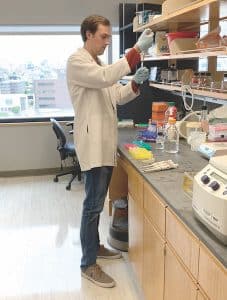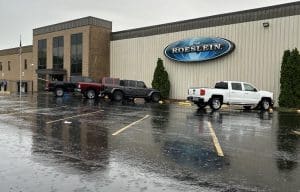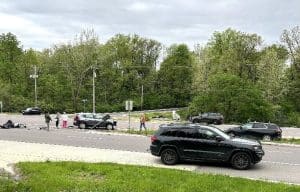Gibault grad researching COVID

A Columbia native is part of a team of researchers at Washington University in St. Louis that is on the forefront of researching the novel coronavirus, with a focus on testing and developing drugs that could treat or serve as a vaccine for COVID-19.
“Knowing the work we are doing will have an impact on every single human in the world makes coming to the lab satisfying and rewarding,” said Spencer Stumpf, who was born and raised in Columbia. “On the flip side, setbacks and missteps are magnified immensely since our work is crucial to the betterment of society and there is a lot at stake. I’m constantly learning and acquiring new skills. It’s immensely gratifying.”
A 2011 Gibault Catholic High School graduate, Stumpf graduated from the University of Missouri with a bachelor’s in biology before earning a master’s in plant pathology at the University of Georgia.
Stumpf was working in a different lab at Wash U prior to transferring to this current one.
His previous job focused on drug discovery, working to find novel antibiotics, antifungals and anti-cancer drugs produced by bacteria that live in soil.
He was looking to move positions to gain more experience and learn new molecular biology practices, however, when Dr. Sean Whelan, a prominent virologist from Harvard, was recruited to come to the Washington University School of Medicine on Jan. 1 to head the molecular microbiology department.
With previous experience in DNA work and a desire to learn more about ribonucleic acid and protein techniques, Stumpf applied for a research scientist position in Whelan’s lab in late January and interviewed in February, “unaware of how significant coronavirus and Dr. Whelan’s research would become.”
“I accepted the position and started in March, right as states across the U.S. were shutting down,” Stumpf said. “As soon as I started, I hit the ground running and was thrust into the research initiatives, which have all been directly related to coronavirus work.”
The lab at Wash U is one of the few in the world that can safely handle the virus. Whelan’s researchers generated a model of the virus by inserting a few of its important genes into another virus that is not harmful to humans.
“Our model behaves like the coronavirus, essentially, and we can then test drugs, including hydroxychloroquine and remdesivir, and antibodies without risk to our safety,” Stumpf explained. “If the drugs and antibodies prevent our model virus from entering mammalian cells, then we can infer they would also prevent SARS-CoV-2 from infecting cells.”
Stumpf is currently shipping this model virus to labs worldwide so they can use it for their coronavirus experiments.
Stumpf is also working on another version of the model virus that is being screened as a vaccine candidate.
“The virus, as I mentioned, does not cause symptoms but will illicit an immune response,” Stumpf noted. “We are pushing this candidate through the clinical trial pipeline. If proven safe and effective, it would be considered for vaccine use in humans.”
Working on subjects arcane to most people means that no two days are the same for Stumpf. His shift can include sending materials to other labs, having meetings with co-workers to discuss next steps and generating and growing mammalian cells to be used in experiments.
Stumpf also pointed out that he and his “tremendously talented” colleagues could not do all this work without donations from Wash U alumni and area residents.
“The resources provided by Washington University School of Medicine coupled with the generosity of people who have a connection to this university and city have allowed us to do truly remarkable and impactful research that couldn’t be done anywhere else,” Stumpf said. “WUSM and St. Louis are the leaders in coronavirus research, and there’s a sense of pride that comes with that.”
Even if his day-to-day work is unfathomable to most people, Stumpf said his time growing up in Monroe County has still helped him. He specifically cited an ability to multitask he learned at Gibualt.
“Students at Gibault are involved in multiple student organizations and sports while maintaining a high expectation for academic success,” Stumpf said. “On a daily basis, I’ll be conducting several research experiments at a time, communicating with various collaborators about COVID-19 research and ensuring we have the necessary supplies to continue our work. This agility allows our team to be successful in better understanding coronavirus.”






